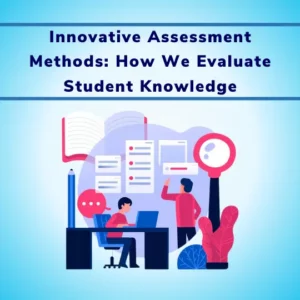Article Contents
Where Online Assessments Are Moving?
Assessment is a major part of the education system today. Many things have changed over the years, but the purpose of assessment remains the same. It allows teachers, schools, and universities to evaluate the learning and performance of the students. Moreover, it helps the teacher adapt the teaching methodologies and course content to the needs of the students.
In the past 2-3 years, online assessment has changed the face of education. The online assessment tools have made it possible for students to get assessed from anywhere at any time.
‘Change is the only thing that is constant’.
This saying perfectly suits the current situation of the world. The world is changing and that too in a positive way. These positive changes are brought by nothing but the extraordinary innovations happening in the field of digitization.
The beginning of the digital era has accelerated the process of adopting various platforms which can help carry out different activities online. Many fields, sectors, industries, institutions, etc. are adopting online modes for carrying out day-to-day activities.
The education sector is one of the most important sectors which have willingly accepted online platforms for online educational purposes.
There are certain platforms which help in conducting courses, classes and assessments related to them. These platforms which are developed using the most innovative technology offer loads of benefits.
These platforms help to carry out all the processes of online education in a very secure and hassle-free manner. These platforms such as the online assessment system offer every feature or technique required to conduct online assessments safely.
These platforms ensure that the assessments thus conducted in online mode prove beneficial to all the entities of education such as schools, colleges, universities, students, parents, etc.
So let us understand all the features offered by the platforms which enable organizing online assessments.
Features of Online Assessment System

The online assessment system comes with features which can help prevent any sort of cheating or malpractice being carried out by the students sitting at any remote location. These features can also promise security, reliability and ease of use. Here are some of the features of the online assessment system.
- Secure Browser
This feature is used to disallow the candidates from opening new windows or browsers. They are prohibited from switching the tabs. All they can see is the screen on which the exam activity is going on. It can also pause or stop any recording software running in the background. - IP address-based proctoring (supervision)
The IP address of the device used by the candidate to give the exam is noted by the online assessment platform as soon as the candidate logs in. This feature blocks access to invalid IPs and also terminates the exam if the same exam is being opened by using the same credentials on a system with a different IP address. - Audit logging
The exam activity such as login logout time, start and end of the exam, exam navigation, the clicking of the mouse, etc are tracked by the online assessments platform with the Audit Logging feature. The system sends error messages if it senses any discrepancy. - Image-based proctoring
This feature is mechanised to capture the photos of the candidates as they take the exam after certain intervals of time. The system checks every photo for any discrepancy such candidate moving away from the camera, two faces in front of the camera, etc. and sends an error notification. - Video proctoring
The web camera is used by a supervisor to keep a watch on the candidate giving the exam. The supervisor can stop the exam immediately if he or she suspects the candidate of cheating. This video footage is stored in the system for later analysis. - Audio proctoring
The online assessment portal is developed to be sensitive to any sounds or voices coming from the candidate’s background. It can capture even the softest sound such as whispering of people, flipping of pages, etc. It sends an error notification to the administrator if it captures any discrepancy. - Object detection
Any suspicious movements such as referring to books or using electronic devices can be detected by the online assessment portal and can stop the exam right away. - User facial recognition
This is an AI-powered feature which can verify the identity of a candidate by using the web camera. The candidate is allowed to take the exam only if the identity is found valid. - Live chatting
Chatbot is yet another AI-powered feature which uses live chatting to solve queries of candidates during examinations. This feature helps to resolve those queries instantly and thus saves time.
There are a few additional features of the online assessment system which are as below:
⮚ These assessments are devoid of location constraints and thus can be given from any location worldwide.
⮚ They can be given by using any internet-based device such as a computer, laptop, tablet or mobile phone.
⮚ They come with a feature of onscreen evaluation which enables the examiners to check the answer sheets online.
⮚ The answer sheets can be downloaded by students or uploaded by examiners easily as they are stored on the Cloud.
⮚ The assessments are also scalable to manage even an extensive number of candidates at the same time.
⮚ The result generation is quick and accurate
⮚ Performance feedback can be measured accurately using online assessment portals
⮚ They are also very cost-effective.
Thus we can see that online assessments come with a plethora of features which certainly make it extremely effortless to conduct exams online.
Now, let us see why the education sector should adopt online assessments.
Advantages of Online Assessments over Traditional Methods
Saves Time:
Online assessments streamline the evaluation process and help save valuable time for both teachers and students. Owing to automated grading and instant result generation, teachers and faculty members can focus on teaching and provide students with prompt feedback.
Secure Evaluation:
Online assessments utilize advanced security measures like randomized question banks which helps reduce the risk of cheating and ensure a fair evaluation process.
Accuracy during Evaluation:
Automated grading in online assessments eliminates human errors, providing accurate and consistent evaluation, which is crucial for maintaining the credibility of assessments.
Engaging Format of Exams:
Online assessments can increase student engagement by up to 80%. Online assessments often incorporate multimedia elements like images and videos that make the exams more interactive and engaging for students. This enhances their learning experience.
No Need for Infrastructure:
Unlike traditional methods that require classrooms and writing materials, online assessments can be conducted remotely. Online assessments eliminate the need for dedicated infrastructure and exam related materials.
Less Workload on Administrative Staff:
Online assessments help reduce administrative burdens as they automate tasks like exam scheduling, result processing, and data management. This allows staff to focus on other responsibilities.
Environment Friendly:
Online exams can save up to 90% of paper usage compared to traditional exams. Online assessments contribute to a paperless environment by minimizing the use of physical resources like paper and reducing the carbon footprint associated with traditional assessments.
Why education sector should adopt Online Assessments?

Here are a few reasons why the education sector needs to opt for the alternative of online assessments to conduct examinations.
Exams are an absolute must for any educational institution to measure the progress of any student. These exam act as a force which drives the students to learn, understand and recall better.
These exams provide healthy competition which inspires the candidates to do better every time.
Thus, to maintain the tempo of carrying out learning activities adopting online assessments is the safest and most reliable option in the current situation.
As we know by now, these online assessments come with tons of features which can simplify the process of conducting exams, monitoring them and evaluating the answers sheets. Hence, its time to welcome the technology with open arms by the education sector can refrain from the worries related to the online assessments.
Now, let us see the reasons that make online assessments better than classroom-based assessments.
Why Online Assessments are better than Classroom-based Assessments?
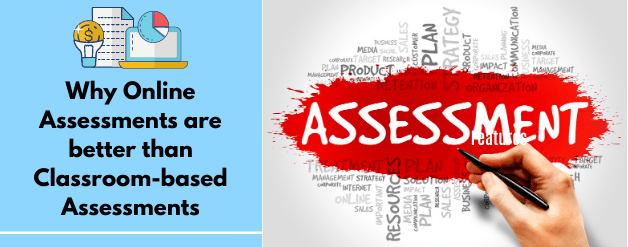
The traditional classroom-based assessments have a few flaws. To begin with, the students have to travel to their respective schools or colleges to fill the exam forms, collect the hall tickets and check the exam time table.
The classroom-based assessments are conducted in classrooms under the supervision of exam invigilators. The management has to arrange for examination halls and the required infrastructure.
They are also responsible for providing question papers and answer sheets to the students as also appointing people for invigilation.
This means that both the students and the teachers are supposed to travel to the exam location allocated to them. The students have to carry identity proofs, hall ticket and material required to write the exam. The answer sheets are carried manually to the center from where they are collected by the examiners.
The examiners evaluate these answer sheets and then submit them again at the center so that they can be sent to the concerned people for result generation.
This entire process is painstakingly tedious, involves loads of manual work and also requires huge investments. But online assessments are developed to overcome all of these flaws and make conducting examination completely unfussy.
The online assessments provide the option to fill forms from anywhere. The exam schedule and an e-copy of hall ticket are shared through email.
The exam credentials are shared through text message using which the candidate’s can login in the portal, show their identity to the web camera and proceed with the exam. The online assessment portals extend abundant features which help the supervisors to monitor the candidates from any location.
The examiners are also provided with credentials to log into the Cloud where the answer sheets are stored. They can evaluate the answer sheets online and upload them on the Cloud. The system will calculate the marks and generate results soon after.
Thus the online assessments help to save the needless travelling as also the investments on infrastructure and manual work.
They help to eliminate the physical handling of answer sheets which helps to protect the answer sheets from getting damaged. Thus online assessments are far better than classroom-based assessments in many ways.
remote areas. Due to the ‘anytime, anywhere testing’ nature of online assessments, they allow students to appear for the exams at their preferred time and location. These assessments adapt to diverse learning needs, provide customized approaches to suit individual students’ strengths and weaker areas.
Online assessments utilize enhanced security measures to put a stop to unauthorized behavior during exams. Advanced AI based algorithms ensure the authenticity of students’ work and maintain the integrity of assessments.
Data-driven insights from online assessments also provide educators with valuable information about students’ performance. This helps to improve learning outcomes.
Continuous assessment through online tools offers a dynamic way of tracking student progress that enables educators to identify learning gaps and customize instruction and learning methods accordingly.
Thus online assessments are far better than classroom-based assessments in many ways.
Now let us understand the impacts of adopting online assessments by the education sector.
Challenges Faced by Education Institutes in Implementing Online Assessments:
The challenges related to technology infrastructure and accessibility arise as institutions strive to ensure all students have equal access to online assessment platforms and a reliable internet connection, especially for students from remote or underserved areas.
Another challenge involves addressing digital literacy related knowledge gaps among students and educators. To overcome the challenge of digital literacy, the educators should be given proper training and guidance to effectively navigate and administer online assessments.
Mitigation Strategies for Challenges in Implementing Online Assessments:
To address the technology infrastructure challenge, investing in updated hardware, software, and network capabilities becomes essential. This technology infrastructure can help create a seamless online assessment environment accessible to all students.
To mitigate the challenge of digital literacy and training, institutions should provide comprehensive professional development programs to teachers and ensure that they are equipped with the necessary skills to confidently use online assessment tools.
Impact of Online Assessments on the educational sector

The online assessments are a boon to the educational sector. All the mechanisms and techniques developed by using modern advance technology have a hoard full of advantages when it comes to online assessments. So now let us have a look at those advantages.
- Digital question papers
The question papers are stored digitally on Cloud. They are stored in an encrypted format and are decrypted just before the exam begins. This prevents the leakage of question papers as also support the ‘Go Paperless’ movement. - Fast and accurate result generation
The online assessment portals which are developed using complex algorithms enable the generation of instantaneous and precise results. - Elimination of exam centres
The candidates can give the exam from any remote location, the invigilators can monitor them from anywhere and the examiners can evaluate the answer sheets online. All this eliminates the need for exam centres. - Reduction in administrative and infrastructure costs
As the exams are conducted online, the management can save all the costs invested on exam centres, manual transport of question papers and answer sheets, manual invigilation, manual evaluation, storage of answer sheets, etc. - The online assessment portals provide the choice of conducting exams in objective or subjective format. These portals provide different means for writing theory answers to the candidates as also provides different features for correcting them to the examiners.
- Remote proctoring feature
The feature of remote proctoring prevents the candidates from cheating even though they might appear for the exam from any remote location. This helps the education entities to conduct online assessments without having doubts about maintaining the integrity of the exams. - Flexibility in conducting exams
The candidate appearing for a certain exam from any geographical location which has different time zones. The online assessments are designed to adjust to the local time zones especially for international candidates. - Analysing the candidates
The online assessment portals can be used to analyse the performances of the candidates. These analytics are based on understanding the scoring patterns which also help to predict future performances of the candidates.
The shift in education involves educators becoming facilitators of learning. This promotes critical thinking and problem-solving skills rather than just delivering information. This transition recognizes the importance of nurturing students’ abilities to utilize technology effectively for better learning experiences.
Online assessments instill digital literacy and technological competence in students. They can engage with evolving digital landscapes in their academic lives. The adaptability nurtured through online assessments prepares students to respond to changing demands, making them better prepared for their future careers.
The education sector can embrace limitless opportunities through EdTech, where online assessments seamlessly integrate with innovative tools to create engaging and effective learning syllabus. Online assessments can facilitate personalized learning journeys that cater to each student’s unique pace, preferences, and learning needs, and revolutionizing the look and feel of education.
Undoubtedly, adoption of online assessments will provide countless advantages and nil amounts of disadvantages.
Summary
Until now, the education sector practiced old traditional ways of conducting examinations. These ways had too many shortcomings to ignore. The education sector today needs a drastic change in the ways of conducting exams. Only technology can make it possible to achieve such radical changes.
Eklavvya is such a platform which can assure the conduction of online assessments in the most uncomplicated and dependable manner. This platform developed at Splashgain has the potential to change the face of traditional classroom based examination and give it a fresh new look with the help of highly advanced technology.
Thus, the impacts of online assessments on the education sector are undeniably the advantageous, convenient, fruitful and profitable.
How does online assessment impact the education sector?
Online assessment is transforming education by offering timely feedback, personalized learning paths, and broader accessibility. It enhances engagement and reduces geographical constraints to pave way for a more inclusive and effective learning environment that aligns with modern technology-driven lifestyles.
What are the best practices for conducting online exams?
To conduct successful online exams, educational institutes must ensure clear instructions, test platform reliability, and sufficient time for completion. Setting diverse question types and utilizing remote proctoring measures are crucial. Proper communication and technical support for students are also vital to ensure a smooth exam experience.
What are the benefits of online assessments over traditional exams?
Online assessments offer faster grading, personalized learning, and the ability to incorporate multimedia elements, making learning more engaging and effective. They exceed geographical barriers, allows flexible exam scheduling, reduces paper waste, and encourages a greener approach. Moreover, anti-cheating or remote proctoring measures and secure authentication enhance the credibility of online assessments.
What is the future of online assessment in the education sector?
The future of online assessment assures even greater integration of AI based learning platforms. Personalized learning methods and real-time insights into students’ progress will become more accurate. The combination of education and technology will create dynamic learning experiences, leading students to well-equipped themselves for the demands of a digital world.



![How Government-Led Exams at 250+ Locations Are Setting New Standards of Integrity [Case Study]](https://www.eklavvya.com/blog/wp-content/uploads/2024/04/Enhancing-Exam-Integrity-Government-Certification-in-250-Locations-150x150.webp)
![Transforming Central Govt. Exams Evaluation: How Onscreen Marking is Leading the Charge [Case Study]](https://www.eklavvya.com/blog/wp-content/uploads/2024/04/How-Onscreen-Marking-Revolutionized-Central-Govt-Exams-Case-Study-1-150x150.webp)

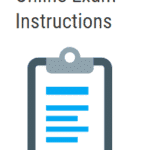

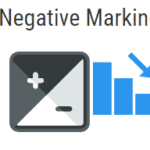










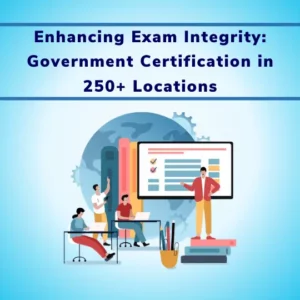
![How Onscreen Marking Revolutionized Central Govt Exams [Case Study]](https://www.eklavvya.com/blog/wp-content/uploads/2024/04/How-Onscreen-Marking-Revolutionized-Central-Govt-Exams-Case-Study-1-300x300.webp)
